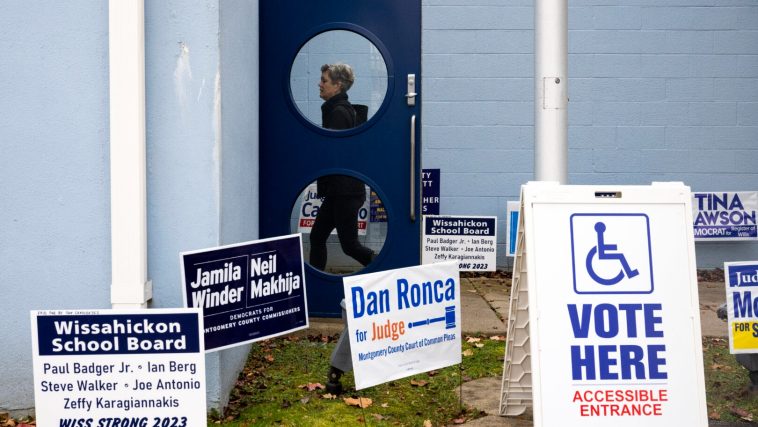An unforeseen error in the coding of a voting machine was reportedly the cause of vote switches in a recent Pennsylvania local court election. As a result of this technological hiccup, votes intended for the Pennsylvania Superior Court candidates Judge Jack Panella and Judge Victor Stabile were inadvertently swapped. The Associated Press (AP) reports that a voter that opted to retain one judge while declining the other would detect, on their touchscreen device printouts, that their choices had been erroneously reversed.
This inconsistency, involving more than 300 voting machines, was highlighted by the County Executive, Lamont McClure, according to the AP. It was the vigilance of voters, encountering mismatches on their printed records, which brought the error into sharp focus. For those who cherish the seamless performance of our democratic process, these observations were alarming.
However, the officials assured that the mishap was confined to Northhampton County and did not impinge on other races. Furthermore, measures are underway to ensure that each candidate receives the votes originally intended for him, as stated by McClure. His effort to minimize the severity of the glitch evoked a modest portrayal of the situation—a little more than a ‘minor glitch.’
The spotlight subsequently turned to the company behind the faulty voting machines — Election Systems & Software (ES&S). A representative from ES&S, Katina Granger, pointed to human error as the primary reason behind the mix-up, and emphasized its occurrence as a singular aberration. This case bears testament to the fact that the advent of technology can sometimes complicate processes, warranting a sense of caution in our ongoing drive towards modernization.
In a related incident from September, the U.S. Supreme Court was requested to respond to an emergency appeal from GOP election officials in Pennsylvania. This plea was tied to potential penalties arising from a dispute over voting equipment used during the 2020 election. It is of importance that institutions maintain not only the efficiency of electoral tools but also the faith in the electoral process, further strengthening our democratic values in an evermore technologically mediated world.
The issue arose when officials from Fulton County granted third parties access to Dominion Voting Systems machines after the election without full commission authorization. Here, the principle of transparency seemed to clash with the need for procedure and authorization. The officials argued that the purpose of permitting third-party access was to determine the viability of continuing with the said machines.
Court filings indicate that several external organizations gained unauthorized access to the voting systems in Fulton County following the 2020 election. It fell as a surprise to the third county commissioner, who was only informed of the inspection of electoral equipment after it had occurred. It underscores the necessity of full transparency within all parts of an organization to ensure the smooth operation of voting systems.
Among the cybersecurity firms that had the opportunity to examine and copy elements of Fulton County’s Dominion Voting System was Wake TSI. This firm was chosen by ‘Defending the Republic,’ a non-profit organization led by Sidney Powell, one-time counsel for former President Trump. Such scenarios highlight the critical intersection between tech and politics, emphasizing the need for clear demarcation yet open dialogue between the two.
Interestingly, none of the third-party groups granted access to the voting systems in Fulton County had direct contracts with the county or held the necessary accreditation to conduct such an examination, court records reveal. This event brought into focus the essential need for authorized accreditation in matters of such high public interest.
In July 2021, it was found that the equipment’s integrity was compromised due to the unsanctioned inspection, making it apparent that a breach in protocol had occurred. This flaunting of procedural norms had potentially undermined the very mechanisms in place to prevent tampering, thus clouding the credibility of the voting systems. This realization spurred the initiation of legal proceedings by the commission and its attorneys.
As the case unfolded, the state secretary discovered plans for yet another unsanctioned inspection of the voting equipment by Fulton County, this time intending to grant Envoy Sage LLC access. With a protective order from the Pennsylvania Supreme Court, the secretary managed to circumvent another possible violation of protocols. Moments such as these emphasize the need for constant vigilance in guarding democracy’s machinery, with the fundamental principles of transparency, procedure, and authorization maintaining a delicate balance.
The Pennsylvania Supreme Court eventually issued this protective order in January of 2022, providing a fitting finale to a sequence of events that have underscored the importance of diligence, transparency, and procedure in the use and inspection of voting equipment. As we progress forward, these incidents serve as lessons, urging us to afford equal attention to the integrity of tools and processes, both as individual components and as integral parts of the larger democratic system.
The ripple effects of these cases extend far beyond the Pennsylvania borders, sending messages of caution to decision-makers nationwide. In our drive towards modernization, it is critical that we safeguard the essence of democratic processes. Ensuring accurate and reliable voting outcomes is more than an operational need; it is a fundamental aspect of upholding democratic principles.
In the ongoing discourse about electronic vs. paper ballots, stories such as these tilt the scales towards a more balanced perspective. While the incorporation of technology into electoral processes aims to enhance efficiency and transparency, it also reinforces the ship of these processes to stay afloat amidst the sea of rapid tech advancements.
Nevertheless, it is clear that our journey towards a more ideal democracy is far from over. Each incident, each error, and each revelation forms a stepping stone in our collective learning. As we strive to make our system more robust and transparent, we must also remember that trust in our democratic process is paramount, alongside the drive for technical perfection.



